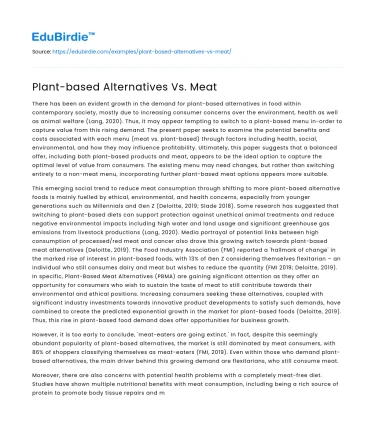There has been an evident growth in the demand for plant-based alternatives in food within contemporary society, mostly due to increasing consumer concerns over the environment, health as well as animal welfare (Lang, 2020). Thus, it may appear tempting to switch to a plant-based menu in-order to capture value from this rising demand. The present paper seeks to examine the potential benefits and costs associated with each menu (meat vs. plant-based) through factors including health, social, environmental, and how they may influence profitability. Ultimately, this paper suggests that a balanced offer, including both plant-based products and meat, appears to be the ideal option to capture the optimal level of value from consumers. The existing menu may need changes, but rather than switching entirely to a non-meat menu, incorporating further plant-based meat options appears more suitable.
This emerging social trend to reduce meat consumption through shifting to more plant-based alternative foods is mainly fuelled by ethical, environmental, and health concerns, especially from younger generations such as Millennials and Gen Z (Deloitte, 2019; Slade 2018). Some research has suggested that switching to plant-based diets can support protection against unethical animal treatments and reduce negative environmental impacts including high water and land usage and significant greenhouse gas emissions from livestock productions (Lang, 2020). Media portrayal of potential links between high consumption of processed/red meat and cancer also drove this growing switch towards plant-based meat alternatives (Deloitte, 2019). The Food Industry Association (FMI) reported a 'hallmark of change' in the marked rise of interest in plant-based foods, with 13% of Gen Z considering themselves flexitarian – an individual who still consumes dairy and meat but wishes to reduce the quantity (FMI 2019; Deloitte, 2019). In specific, Plant-Based Meat Alternatives (PBMA) are gaining significant attention as they offer an opportunity for consumers who wish to sustain the taste of meat to still contribute towards their environmental and ethical positions. Increasing consumers seeking these alternatives, coupled with significant industry investments towards innovative product developments to satisfy such demands, have combined to create the predicted exponential growth in the market for plant-based foods (Deloitte, 2019). Thus, this rise in plant-based food demand does offer opportunities for business growth.
Save your time!
We can take care of your essay
- Proper editing and formatting
- Free revision, title page, and bibliography
- Flexible prices and money-back guarantee
However, it is too early to conclude, 'meat-eaters are going extinct.' In fact, despite this seemingly abundant popularity of plant-based alternatives, the market is still dominated by meat consumers, with 86% of shoppers classifying themselves as meat-eaters (FMI, 2019). Even within those who demand plant-based alternatives, the main driver behind this growing demand are flexitarians, who still consume meat.
Moreover, there are also concerns with potential health problems with a completely meat-free diet. Studies have shown multiple nutritional benefits with meat consumption, including being a rich source of protein to promote body tissue repairs and muscle building as well as supplying zinc to boost immunity and essential amino acids that help in digestion (Nagdeve, 2020). Some also suggest that there are certain exclusive benefits in meat consumption that cannot be substituted with vegetarian diets (Nagdeve, 2020). Therefore, current meat consumers may be unwilling to switch to a complete vegetarian/vegan diet due to health concerns. Additionally, a recent systematic review across 12 eligible trials concluded that there is high uncertainty regarding causal relationships between meat consumption and potential cancer outcomes (Zeraatkar et al., 2019). Such results suggest that meat consumption does not have a definite positive link with cancer outcomes portrayed in certain media. Contrastingly, there has been growing scrutiny over the supposed 'healthiness' of plant-based alternatives, such as high salt content and frequent use of genetically modified crops within these products (Deloitte, 2019). Therefore, it is difficult to conclude an overriding winner between meat vs. vegetarian consumption.
Furthermore, Slade (2018) found that even when told both beef and plant-based alternative burgers are hypothetically the same in taste and nutritional values, participants still showed a marked preference for beef, with only 21% of participants choosing the plant-based burger. Consumers are not as welcoming towards these options as one may think. Literature also points out that it is difficult for habitual meat-eaters to utterly eliminate meats from their diet (Lang, 2020). Therefore, from the view of consumer acceptability – the complete eradication of meat options on the menu will likely incur negative receptibility from consumers. Such consequences will result in unhelpful outcomes for both profitability and environmental concerns. Instead, methods prompting a reduction in meat consumption requires the least behaviour change and is therefore far more likely to appeal to the mainstream population, in comparison to fully replacing or substituting meat in meals (Lang, 2020). The incorporation of both meat and plant-based alternatives will likely lead to most consumer acceptability meaning there will likely be an overall decrease in meat consumption (good for the environmental) and an increase in profitability (from satisfying needs of a broader range of consumers' needs).
Overall, it appears that the increasing demand for plant-based alternatives represents great opportunities to encourage company growth. Ongoing investments from large companies as continuous innovations from smaller organizations all suggest the failure to adapt to this strong market trend may cause the company to fall behind potential competitors and suffer in profitability (Deloitte, 2019). However, it is evident that meat consumption still holds a significant place in the market, with the majority of omnivore consumers finding it difficult to eliminate meat from their diet. Therefore, both the complete eradication of meat and remaining without sufficient plant-based alternatives seem unwise. The addition of plant-based alternatives to the current menu of both meat and vegetarian options may be more suitable as it allows maximum flexibility in meeting differing consumer needs and demand.






 Stuck on your essay?
Stuck on your essay?

